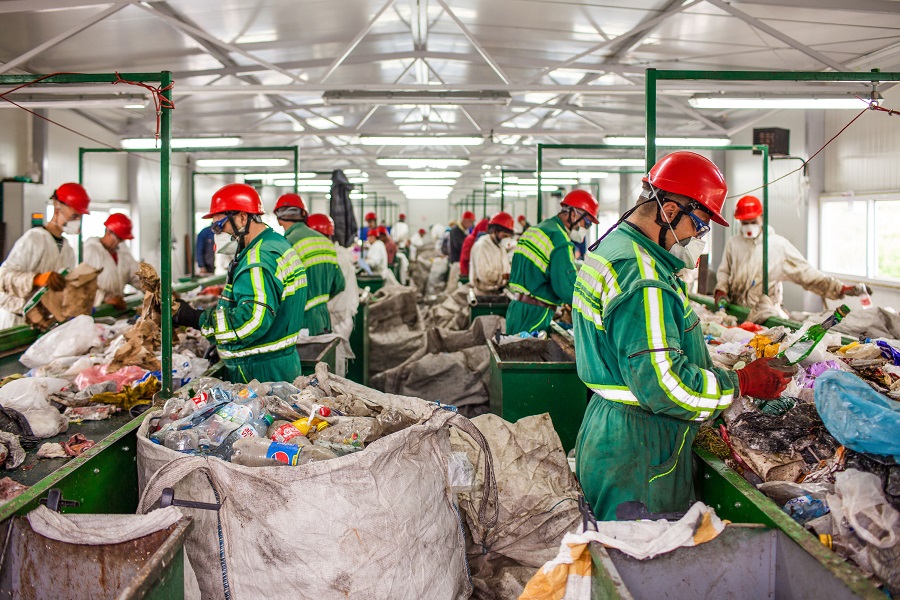

MUMBAI/DELHI/AGRA:
Recognizing the need to address the challenge of marine plastic pollution, Geocycle the global waste management arm of LafargeHolcim, the world’s global leader in building solutions is piloting in India a smart and non-invasive technology to remove plastics from canals before they reach the oceans.
LafargeHolcim is the parent company of Ambuja Cements, and ACC Ltd., the two major cement producing companies in India. Geocycle India is the inhouse waste management arm of Ambuja and ACC. It is a leading provider of industrial, agricultural, municipal and plastic waste management services.
Geocycle is implementing the innovative ‘bubble curtain’ technology for the first time in India to stop plastic from entering the river Yamuna. The Geocycle Bubble Barrier has been established on the Mantola Canal of Agra City in Uttar Pradesh, which carries 40% of the storm and wastewater of Agra City.
Geocycle, under the aegis of United Nations Environment Programme (UNEP) India’s “Air Pollution Control Action Plan”, has partnered with Agra Municipal Corporation and GIZ India with Canadian Pond as technology provider, working towards the mission of making Agra plastic-free. Once successful, this technology will be replicated in other countries. Geocycle supports the Swachh Bharat Mission by co-processing significant volumes of municipal solid waste, including non-recyclable plastics across India.
“Geocycle’s approach to river plastic cleaning is distinct from other river clean-up projects which rely on landfilling or incineration. Geocycle’s vast co-processing infrastructure guarantees safe and environmentally friendly final treatment of the collected waste: co-processing in cement kiln recovers energy and recycles material value in waste, leaving no residue,” said Neeraj Akhoury, CEO India, LafargeHolcim and MD & CEO of Ambuja Cements Limited.
“These two technologies – bubble curtain and co-processing combined – offer a good opportunity to fight the challenge of marine litter by tackling the problem at the source,” he added.
“UNEP India is happy to collaborate with Geocycle for the pilot project ‘Plastic Free Agra’ for the cleanup of riverine plastic waste by targeting the channels leading to the Yamuna river. The Geocycle Bubble Barrier is an innovative concept based on existing technology which makes smart use of a combination of natural currents and a bubble curtain to channelize plastic waste towards the banks of rivers and canals instead of it flowing directly into the Yamuna river, from where it is collected for safe treatment,” says Atul Bagai, Head India Country Office, UN Environment Programme.
A bubble curtain is a non-invasive solution to stop plastic from entering the oceans. Ships and fish can pass through the air bubbles, but plastics will be stopped. The bubble screen is created by a specially designed air tube which is placed diagonally on the bed of the canal or river. It brings waste to the surface, channels the plastic on to the banks where it can be extracted. The bubble barrier is generated using compressed air passing through tubes that are placed at the bottom of the canal. These tubes are connected with a compressor which is powered by renewable solar energy. Further, aeration in the canal will increase dissolved oxygen levels in the waste water/storm water leading to an overall improvement in the water quality.
The Mantola canal has been selected for this unique project as it carries 40% of Agra city’s wastewater. Moreover, the plastic leakage into the canal is significant. Capturing the plastics floating in this canal will help in preventing the plastic litter of the Yamuna River.
The plastic waste extracted from the canal will be taken to a Municipal Solid Waste treatment and Materials Recovery Facility. The recyclable plastics will be sent to recycling facilities, while the non-recyclable plastics will be taken to Geocycle’s facility for pre-processing followed by co-processing in ACC or Ambuja cement kilns.
11 million tons of plastic enter the oceans every year, making it one of the biggest threats society faces. If this trend continues unabated there will be more plastic than fish in the oceans by 2050. Most of the plastic in the ocean gets there by way of rivers.
more recommended stories
THIRUVANANTHAPURAM:Kerala Industrial Infrastructure Development Corporation (KINFRA).
THIRUVANANTHAPURAM:The State Budget for 2026-27, presented.
KOCHI:The Kerala Startup Mission (KSUM) has.
KOCHI:Cochin International Airport Limited, in collaboration.
KOLLAM:With multiple infrastructure projects underway, improved.
KOCHI:Scaling up its overseas market, Kerala.
THIRUVANANTHAPURAM:The hugely successful Adopt-a-Village programme spearheaded.
THIRUVANANTHAPURAM:Leading Robotics Process Automation (RPA) and.
KOCHI:“Kerala has evolved as an ideal.
MUMBAI:Bharat Petroleum Corporation Limited (BPCL), a.